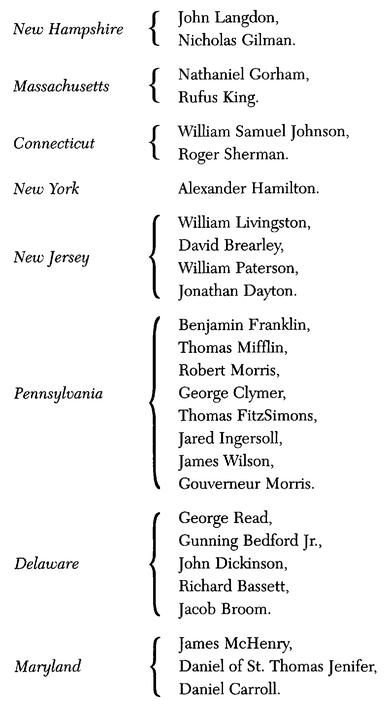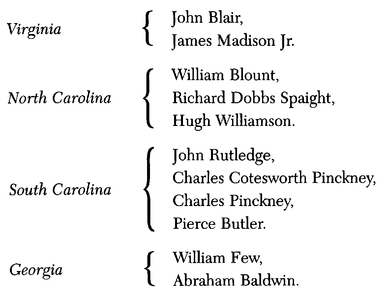The Federalist Papers (83 page)
Read The Federalist Papers Online
Authors: Alexander Hamilton,James Madison,John Jay,Craig Deitschmann
Tags: #General, #United States, #History, #Law, #Legal History, #Current Events, #History: American, #Political Science, #United States - Revolutionary War, #History & Theory - General, #Politics, #History & Theory, #Revolutionary Period (1775-1800), #USA, #Political Ideologies - Democracy, #Constitution: government & the state, #Constitutions, #Government, #American history: c 1500 to c 1800, #Constitutional & administrative law, #Constitutional history, #Constitutional history - United States, #Constitutional, #Constitutional law, #Law: General & Reference, #c 1800 to c 1900, #History of the Americas, #Government - U.S. Government, #c 1700 to c 1800, #U.S. Constitutional History, #Political structure & processes, #Sources, #U.S. History - Revolution And Confederation (1775-1789), #Constitutional law - United States, #Modern history to 20th century: c 1700 to c 1900

VI
VII


(p. 17) [No. 2]
“FAREWELL!
A
LONG FAREWELL, TO ALL MY GREATNESS”:
The quotation is from Cardinal Wolsey’s speech in Shakespeare’s
Henry VIII
(act 3, scene 2), when Wolsey suddenly recognizes his imminent downfall. The historical Cardinal Wolsey (c. 1475-1530) was named lord chancellor of England in December 1515, stripped of the title in October 1529, and arrested for high treason in November 1530.
(p. 30) [No. 6]
The celebrated Pericles, in compliance with the resentments of a prostitute,.. attacked, vanquished, and destroyed the city of the
Samnians: Aspasia, referred to in Hamilton’s note, was the mistress of Pericles (c.495-429 B.C.), an Athenian statesman. She was not an Athenian citizen and so could not marry Pericles under Athenian Solanic law until he received special legal dispensation to make her his wife, which he did. She was a consort, or
hetairi,
not a prostitute. (The Greek term for prostitutes was
pornai,
the root of our word “pornography.”) The deep-seated hostilities between Samos, a competitor in sea power, and Athens had little to do with Aspasia or her relation to Pericles. (Hamilton means “Samians,” from his source in Plutarch, when he refers to “Samnians.”)
(p. 30) [No. 6]
The ambitious cardinal, who was prime minister to Henry VIIIth, permitting his vanity to
aspire
to the triple crown, entertained hopes of succeeding in the acquisition of that splendid prize by the influence of the emperor Charles Vth:
Hamilton’s reference to a triple crown and Charles V (1500-1558) referred in part to the facts that Charles succeeded Ferdinand as ruler of Spain and was in line to inherit the kingships of both Italy and Germany, which he eventually did. In parallel fashion, Thomas Wolsey, already a cardinal and archbishop of York (as well as chancellor of England), aspired to the papacy itself through his diplomatic maneuverings with Charles V, who could be expected to control the next papal succession through his dominant position in Europe.
(p. 31) [No. 6]
The influence which the bigotry of one female, the petulances of another, and the cabals of a third.. have been too often descanted upon not to be generally known:
Françoise d‘Aubigné, marquise de Maintenon (1635-1719), Sarah Jennings, the duchess of Marlborough (1660-1744), and Jeanne-Antoinette Poisson Pompadour (1721-1764) were all women who held political sway through romantic attachment to a powerful male figure. The Duchess of Marlborough was married to General John Churchill, first duke of Marlborough, and also was close to Queen Anne of England. Madame de Maintenon was French King Louis XIV’s second wife, and Madame de Pompadour was the mistress of Louis XV All were considered notorious and criticized in their day for wielding improper influence.
(p. 32) [No. 6]
Pope Julius the Second found means to accomplish that formidable league, which gave a deadly blow to the power and pride of that haughty republio:
The League of Cambrai was an alliance of Pope Julius II (1443-1513), the Holy Roman Emperor Maximilian I (1459-1519), the French King Louis XII (1462-1515), and Ferdinand II of Aragon (1452-1516). Together, their forces fought a successful war with the Republic of Venice between 1508 and 1510, winning a major battle, mostly with French troops, at Agnadello in 1509. The League came apart quickly in 1510 when Ferdinand and the Pope switched sides, viewing the victorious French as a greater threat than Venice. Hamilton means to display the viciousness and instability of all European politics.
(p. 51) [No. 9]
In the Lycian confederacy, which consisted of twenty-three CITIES... the largest were entitled to three votes in the COMMON COUNCIL... the smallest to
one: The Lycian confederacy, established on the southwestern coast of Asia Minor in 200 B.C., was made up of many small communities; it survived repeated invasions until the Romans conquered it in A.D. 43. The passage from
The Spirit of the Laws
(book 9, chapter 3) by Charles, baron de Montesquieu (1689-1755), which Hamilton quotes a few lines down, talks about the inequality of members in a confederacy, a point Hamilton wanted to contest. Opponents used “the celebrated Montesquieu” to challenge inequalities in a stronger union and to warn that large states would swallow smaller ones.
(p. 65) [No. 11] *
Recherches philosophiques sur les Americains:
Americans resented the claims of eighteenth-century European scientists that Nature produced inferior species in the New World with its further implications about the American mind. Intellectuals like Franklin and Jefferson spent much time and energy refuting the theory. The member of the group of “profound philosophers” to whom Hamilton sarcastically refers here is the Dutchman Cornelius De Pauw (1739-1799), author of
Recherches philosophiques sur les Américains (Philosophical Studies of the Americans);
he could as easily have chosen Georges-Louis Leclerc, comte de Buffon (1707-1788), who wrote a multivolume
Histoire naturelle, générale
et
particulière (Natural History, General and Particular).
(pp. 104-105) [No. 19]
In Donawerth, a free and imperial city of the circle of Suabia.... the city was put under the ban of the empire; and the duke of Bavaria.. , . took possession of it in his own name; disarmed and punished the inhabitants, and re-annexed the city to his domains:
Through the example of an independent city losing its liberty over a pretext, Hamilton shows that a weaker union like a confederation will be more susceptible to internal invasion from one of its parts than a stronger federation. His source for this piece of history, mentioned cryptically in his own note, is Christian Friedrich Pfeffel’s
Nouvel Abrégé chronologique de l’histoire et du droit publique d‘Allemagne
(1766;
New Chronological Summary of the History of the Public Law of Germany).
(p. 157) [No. 29]
In reading many of the publications against the constitution, a man is apt to imagine that he is perusing some ill written tale or romance...
“Gorgons, Hydras, and Chimeras dire”: The “ill written tale or romance” that Hamilton quotes here is none other than John Milton’s
Paradise Lost
(book 2, line 628). The passage describes Satan’s recently fallen minions in a “universe of death” far worse than any of them could have imagined as they begin to explore their new home, Hell.
(p. 373) [No. 67]
the writer who (whatever may be his real merit) has had no inconsiderable share in the applauses of his party.... Let him now be confronted with the evidence of the fact; and let him ... justify or extenuate the shameful outrage he has offered to the dictates of truth, and to the rules of fair dealing:
Hamilton footnotes
Cato’s Letters
to underscore his criticism of the excesses in anti-federalist propaganda against the Constitution. When John Trenchard and Thomas Gordon began writing their series of anti-authoritarian essays for the
London Journal
in 1720, they chose the pen name “Cato” after Cato the Younger (95-46 B.C.), the noblest and most disinterestedly patriotic critic of Julius Caesar. Americans of all party affiliations admired and imitated
Cato’s Letters
because of their high-minded criticisms of unwarranted authority and claims of patriotism. Scholars argue that Trenchard and Gordon were as influential at the time as John Locke in shaping American political rhetoric, and Hamilton owes something of his own design in
The Federalist
to this source. The bare reference would have been enough to raise a familiar line of thought in Publius’s readers.
(p. 379) [No. 68]
Though we cannot acquiesce in the political heresy of the poet, who says
“For forms of government, let fools contest.... /“That which is best administered is best”: The passage is from An Essay on Man, by Alexander Pope (1688-1744). Hamilton, no poet, hurts the tonalities by misquoting it. The original reads as follows: ”For Forms of Government let fools contest; / Whate’er is best administer’d is best” (epistle 3, lines 303-304).